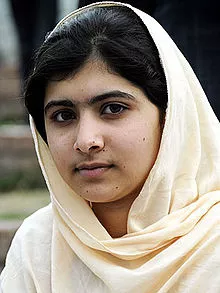Sons, Malala, and the binders full of women
Ever since I heard about Malala Yousafzai, the 14-year old Pakistani girl who was shot in the head by the Taliban for defending her right to an education, I have been thinking about the daughter I didn't have.

- Wikipedia
- Yousafzai
It's no secret that, at the beginning of my pregnancy with Pau, I was hoping for a girl. Obviously, now that our second son is here, we wouldn't trade him for all the pink tutus in the world. But before he arrived, we imagined that having a child of each sex would provide us with the best of both worlds. Tony and I are pretty sure (but not sure enough to take any permanent measures) that we only want two children, so the possibility of a little girl in our future is unlikely. Still, Malala's tragic shooting has had me thinking about that improbable little girl all week.
If she existed, how could I explain to her what happened in Pakistan? What would I say to her when she inevitably asked me, "But why, mama?" And how could I look at her and tell her she can do and be anything she wants knowing full well that, even in the United States, she'd probably face great discrimination and misogyny?
I'll be honest and confess that my initial reaction to these thoughts was relief that I gave birth to a couple of boys.
But my relief doesn’t help the situation any. And, although there isn’t much I can do about the Taliban and the events that take place on the other side of the world, I can teach my boys to stand up for girls and women right here, at home.
I fully realize that the inequalities women face in America can’t be compared to the horrific oppression they confront in countries like Pakistan, but it all stems from the same place — the idea that men are worth more. And this idea gets perpetuated in the U.S. when we have mega church pastors say that men cheat because their wives let themselves go; when we have radio hosts call young ladies sluts because they want access to contraception; and when presidential candidates boast about binders full of women who are given flexible work schedules so that they can get home in time to make dinner for their families.
I don’t need to have a daughter to bring up these inequalities with my children. As a matter of fact, I think that discussing these issues with boys is one of the keys to getting past them. And I plan to do just that.
My greatest hope is to raise young men who ask “why” on behalf of their girlfriends and female classmates; who believe that dads can make dinner just as often and as well as moms can; who feel the same outrage that girls do about Malala’s shooting; and who never believe, not for a second, that the value of women can be relegated to a binder.
